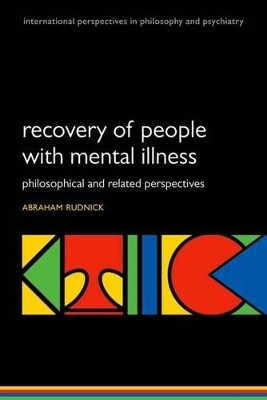
Recovery of People with Mental Illness
Philosophical and Related Perspectives
Seiten
2012
Oxford University Press (Verlag)
978-0-19-969131-9 (ISBN)
Oxford University Press (Verlag)
978-0-19-969131-9 (ISBN)
It is only in the past 20 years that the concept of 'recovery' from mental health has been more widely considered and researched. This book is unique in addressing philosophical issues - including conceptual challenges and opportunities - raised by the notion of recovery of people with mental illness.
It is only in the past 20 years that the concept of 'recovery' from mental health has been more widely considered and researched. Before then, it was generally considered that 'stability' was the best that anyone suffering from a mental disorder could hope for. But now it is recognised that, throughout their mental illness, many patients develop new beliefs, feelings, values, attitudes, and ways of dealing with their disorder. The notion of recovery from mental illness is thus rapidly being accepted and is inserting more hope into mainstream psychiatry and other parts of the mental health care system around the world. Yet, in spite of conceptual and other challenges that this notion raises, including a variety of interpretations, there is scarcely any systematic philosophical discussion of it.
This book is unique in addressing philosophical issues - including conceptual challenges and opportunities - raised by the notion of recovery of people with mental illness. Such recovery - particularly in relation to serious mental illness such as schizophrenia - is often not about cure and can mean different things to different people. For example, it can mean symptom alleviation, ability to work, or the striving toward mental well-being (with or without symptoms). The book addresses these different meanings and their philosophical grounds, bringing to the fore perspectives of people with mental illness and their families as well as perspectives of philosophers, mental health care providers and researchers, among others.
The important new work will contribute to further research, reflective practice and policy making in relation to the recovery of people with mental illness.It is essential reading for philosophers of health, psychiatrists, and other mental care providers, as well as policy makers.
It is only in the past 20 years that the concept of 'recovery' from mental health has been more widely considered and researched. Before then, it was generally considered that 'stability' was the best that anyone suffering from a mental disorder could hope for. But now it is recognised that, throughout their mental illness, many patients develop new beliefs, feelings, values, attitudes, and ways of dealing with their disorder. The notion of recovery from mental illness is thus rapidly being accepted and is inserting more hope into mainstream psychiatry and other parts of the mental health care system around the world. Yet, in spite of conceptual and other challenges that this notion raises, including a variety of interpretations, there is scarcely any systematic philosophical discussion of it.
This book is unique in addressing philosophical issues - including conceptual challenges and opportunities - raised by the notion of recovery of people with mental illness. Such recovery - particularly in relation to serious mental illness such as schizophrenia - is often not about cure and can mean different things to different people. For example, it can mean symptom alleviation, ability to work, or the striving toward mental well-being (with or without symptoms). The book addresses these different meanings and their philosophical grounds, bringing to the fore perspectives of people with mental illness and their families as well as perspectives of philosophers, mental health care providers and researchers, among others.
The important new work will contribute to further research, reflective practice and policy making in relation to the recovery of people with mental illness.It is essential reading for philosophers of health, psychiatrists, and other mental care providers, as well as policy makers.
Dr. Abraham (Rami) Rudnick, BMedSc, MD, MPsych, PhD, CPRP, FRCPC, is a psychiatrist and a philosopher who conducts research, teaches, practices clinically and leads mental health care services in Canada. His particular expertise is in bioethics and in psychiatric rehabilitation, especially in relation to people with serious mental illness such as schizophrenia. In his work, he addresses philosophical aspects of health and its correlates and recovery of people with mental illness.
SECTION 1: FIRST PERSON ACCOUNTS IN RELATION TO RECOVERY; SECTION 2: HISTORICAL, EPISTEMOLOGICAL AND METAPHYSICAL ASPECTS OF RECOVERY OF PEOPLE WITH MENTAL ILLNESS; SECTION 3: JUSTICE AND OTHER ETHICAL ASPECTS OF RECOVERY OF PEOPLE WITH MENTAL ILLNESS
| Erscheint lt. Verlag | 6.9.2012 |
|---|---|
| Reihe/Serie | International Perspectives in Philosophy & Psychiatry |
| Verlagsort | Oxford |
| Sprache | englisch |
| Maße | 179 x 238 mm |
| Gewicht | 524 g |
| Themenwelt | Geisteswissenschaften ► Philosophie |
| Geisteswissenschaften ► Psychologie ► Klinische Psychologie | |
| Medizin / Pharmazie ► Medizinische Fachgebiete ► Medizinethik | |
| Medizin / Pharmazie ► Medizinische Fachgebiete ► Psychiatrie / Psychotherapie | |
| Studium ► Querschnittsbereiche ► Geschichte / Ethik der Medizin | |
| ISBN-10 | 0-19-969131-2 / 0199691312 |
| ISBN-13 | 978-0-19-969131-9 / 9780199691319 |
| Zustand | Neuware |
| Haben Sie eine Frage zum Produkt? |
Mehr entdecken
aus dem Bereich
aus dem Bereich
Die Geschichte eines Weltzentrums der Medizin von 1710 bis zur …
Buch | Softcover (2021)
Lehmanns Media (Verlag)
17,95 €
Krankheitslehren, Irrwege, Behandlungsformen
Buch | Softcover (2024)
C.H.Beck (Verlag)
39,95 €


